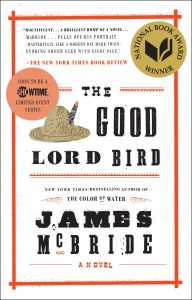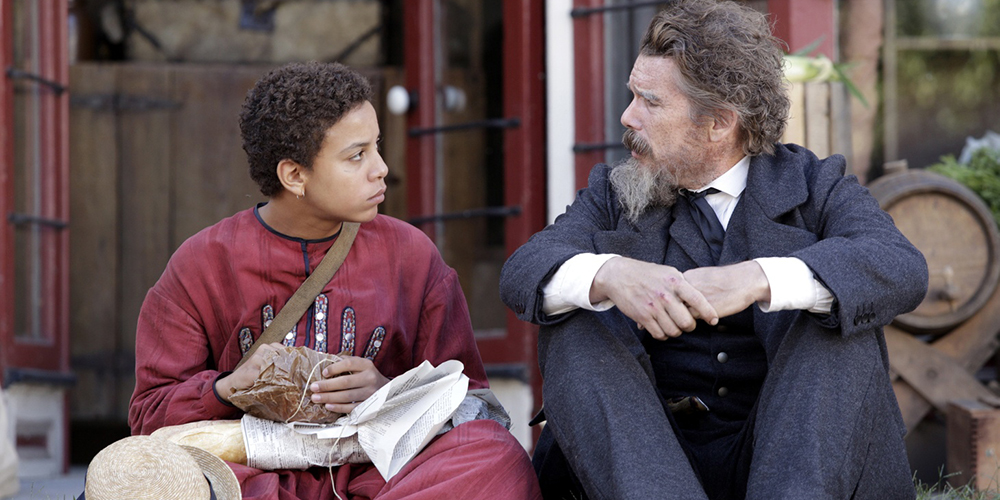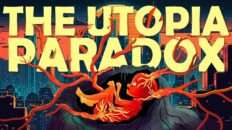Naturally, these reflections are partial; I will concentrate on John Brown, though a good case can be made that Brown is a supporting character. That is certainly true in the novel, but I am not convinced it is in the television series. The TV series presents a John Brown who is recognizably descended from Captain Ahab—driven by an inner light that seems mad to everyone around him, driven even to his own destruction and that of his followers. One can imagine Harold Bloom encountering this John Brown and expanding on his idea of the American religion as one that recognizes its own hidden inner divinity. Bloom’s own arguments about American religion seem to derive both from his own idiosyncratic Gnostic Judaism and from his reading of Emerson, who speaks in “The Over-soul” of the inner divinity:
The Supreme Critic on the errors of the past and the present, and the only prophet of that which must be, is that great nature in which we rest, as the earth lies in the soft arms of the atmosphere; that Unity, that Over-soul, within which every man’s particular being is contained and made one with all other; that common heart, of which all sincere conversation is the worship, to which all right action is submission; that overpowering reality which confutes our tricks and talents, and constrains every one to pass for what he is, and to speak from his character, and not from his tongue, and which evermore tends to pass into our thought and hand, and become wisdom, and virtue, and power, and beauty.
Hawke’s Brown is recognizably an individual who is so in touch with the inner Divine that his sanity seems madness to the world; fired by this inner drive, he does not care–though he does know–how insane he seems. The novel’s John Brown is not so titanic a figure. There are places, particularly toward the end of the novel, where something resembling the television version peeps through. But the John Brown of television is Ethan Hawke’s own creation; he warps the narrative around himself much as Brando warps the film version of A Streetcar Named Desire.
 If anything, the true progenitor of McBride’s The Good Lord Bird (and here I find myself talking like Bloom) is not Moby-Dick but Huckleberry Finn. Both novels are irreverent comedies about serious matters told from the perspective of an adult remembering his antebellum childhood. Both are coming-of-age tales in which the young protagonist travels, in picaresque fashion, with an adult of another race and in the process discovers important truths about himself. The Onion (played onscreen by Joshua Caleb Johnson) seems to derive from Huck Finn his self-awareness and wry eye for hypocrisy but he adds a crucial element of sexual confusion (or desire, which at thirteen or fourteen is the same thing). The central gag of the novel—that Henry “the Onion” has been mistaken for a girl and chooses to continue as one to appease first John Brown and then various white pro-slavers—would seem to be a gloss on the episode in Twain where Huck disguises himself as a girl and is unable to pull it off. The Onion does pull it off, partly because (as the novel asserts) white people can’t tell the difference anyway.
If anything, the true progenitor of McBride’s The Good Lord Bird (and here I find myself talking like Bloom) is not Moby-Dick but Huckleberry Finn. Both novels are irreverent comedies about serious matters told from the perspective of an adult remembering his antebellum childhood. Both are coming-of-age tales in which the young protagonist travels, in picaresque fashion, with an adult of another race and in the process discovers important truths about himself. The Onion (played onscreen by Joshua Caleb Johnson) seems to derive from Huck Finn his self-awareness and wry eye for hypocrisy but he adds a crucial element of sexual confusion (or desire, which at thirteen or fourteen is the same thing). The central gag of the novel—that Henry “the Onion” has been mistaken for a girl and chooses to continue as one to appease first John Brown and then various white pro-slavers—would seem to be a gloss on the episode in Twain where Huck disguises himself as a girl and is unable to pull it off. The Onion does pull it off, partly because (as the novel asserts) white people can’t tell the difference anyway.
But underneath his girls’ clothes the Onion is a straight man, or beginning to be one, and McBride is much more frank than the series in discussing exactly what that entails in the way of physiological responses. Here one might suggest that McBride missed a chance: the existence of “sissies” is known and discussed and even (barely) tolerated in the novel, but the Onion claims not to be one. Then again–and here I’m getting into the weeds of how the novel is told, which is what really sets it apart from the television series–McBride nests the John Brown story inside a retrospective account by Henry Shackleford as told to a man named Higgins. And the framing narrative that frames the Higgens narrative tells us that Shackleford’s fellow church-members thought him a woman until he was caught “scoundreling and funny-touching a fast li’l something named Peaches.” Are we to take it then that the masquerade continued late into Shackleford’s life? And in that case, how strongly should we take his insistence that he hates wearing a dress?
That minor incongruity sets the reader up for all sorts of narrative slipperiness. The novel’s story is buried three or four layers deep, nested in narratives by people who may or may not be credible and who may or may not be disguising their true nature. Determining what is true and what is false is a central task for the reader–at least twice, The Onion makes claims about historical events (such as who died and who lived at a given moment) that are later shown to be incorrect or are flatly contradicted by the historical record. This ambiguity is part of the novel’s larger theme of hidden truth vs. appearance. The Onion looks like a girl but is really a boy (who will become a man who looks like and is taken for a woman). John Brown looks like a madman but is really a saint (is really, even, in some strange way, God himself, if Onion’s late-novel revelation can be taken at face value). The raid on Harper’s Ferry looks like a failure, but in its aftermath Brown is able to do more for the cause of abolition than ever before.
These tensions bring to mind a Pauline paradox: that strength is perfected in weakness. This inversion is central to certain forms of Christianity, though not exclusively. It is also an inversion central to the novel’s conclusion. There is, after all, no way out of the historical fact that John Brown died and that his body, as the song informs us, lies a-mouldering in his grave. And yet there is the parable of the Good Lord Bird:
He reached into his shirt pocket and pulled out a Good Lord Bird feather. “The Good Lord Bird don’t run in a flock. He flies alone. You know why? He’s searching. Looking for the right tree. And when he sees that tree, that dead tree that’s taking all the nutrition and good things from the forest floor. He goes out and gnaws at it, and he gnaws as it till that thing gets tired and falls down. And the dirt from it raises the other trees. It gives them good things to eat. It makes ‘em strong. Gives ‘em life. And the circle goes ‘round.”
This faith of Brown’s is a faith in a hidden truth that will at last be revealed (and has already been revealed to the mad prophet).
This is where we get back to mad old Ahab and his search to uncover the hidden truths of creation. McBride’s Brown is not on the level of Melville’s Ahab, and arguably shouldn’t be, but both of them are driven not just by a desire for revelation but by a desire to reveal—to be the revelator. Guided by an inner voice (which Brown calls God and Ahab accepts as himself), both men rage against a world that is built on injustice and cruelty. Ahab rages and fails and is magnificent and godlike in his failure. McBride’s John Brown rages and succeeds, becoming at least (as W. E. B. DuBois suggested of the real John Brown) an “eternal truth.” He is transfigured from madman to messiah (the truest messiahs are the most mad) and converted in the final lines of the novel into the Good Lord Bird itself:
Them Negroes was far away from the doings on the plaza where the Old Man was to hang, way out from it. But they sang it loud and clear….
Blow ye trumpet blow
Blow ye trumpet blow….
You could hear their voices for a long way, seemed like they lifted up and carried all the way into the sky, lingering in the air long afterward. And up above the church, high above it, a strange black-and-white bird circled ‘round, looking for a tree to roost on, a bad tree, I expect, so he could alight upon it and get busy, so that it would someday fall and feed the others.
Somehow in the midst of all this I’ve come back to Brown, even though I started out insisting that he is not as central to the narrative of the novel as he is in the television series. Perhaps this says more about my own preoccupations than it does about the book, since all criticism is a species of autobiography. In the novel, these events are conveyed through the Onion’s voice, which takes the pretentiousness down a peg or two and does de-center Brown; Henry is (or, rather, Henry remembering himself is) a shrewd observer, locating weaknesses in Brown and in other figures such as Frederick Douglass (who, if anything, comes off rather worse than he does in the show). It’s a voice that (like Huck Finn’s) destabilizes both judgment and praise and gropes its way to righteousness—assuming any of this is true (again, the question is thrown back to us because we cannot be sure how much of the story has been tampered with on its two-or-three stop journey to us).
Perhaps, then, it is this voice, Shackleford’s by way of Higgens, that transfigures Brown and is the true agent of revelation. Another wheel inside of the wheel—another hidden truth: the voice of the people becomes the voice of God. It’s apocalypse all the way down.








